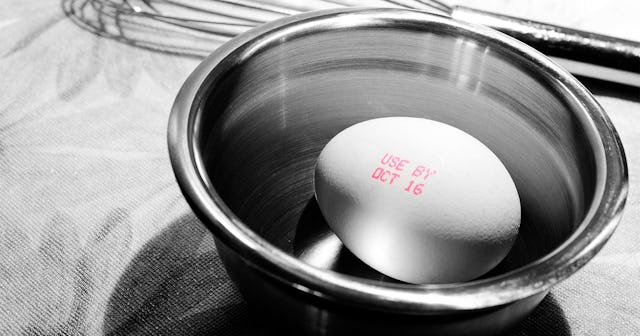Food Expiration Dates Aren't Expiration Dates? Help Please

I come from a family of food scientists. You might think that because of this we were sticklers for food expiration dates, that we never had a salad dressing or jar of pickles or gallon of milk in the fridge past that printed date on the container. You would be wrong. Because expiration dates don’t mean what you think they mean.
First things first, let’s clear up some oft-misunderstood terminology. Most dates on the bottom of jars or cans are actually use by dates, not expiration dates. These dates aren’t the date when the food turns to toxic poison that’ll leave you spending hours in the bathroom. They’re just recommended dates when the product will taste best. And they’re completely voluntary. That’s right, other than infant formula, food dating isn’t required by the U.S. Food and Drug Administration (FDA).
“[Food product dating] acts solely as the manufacturer’s best guess as to when its product will no longer be at peak quality, whatever that means,” reports The New York Times. “Food manufacturers also tend to be rather conservative with those dates, knowing that not all of us keep our pantries dark and open our refrigerators as minimally as necessary.”
So that jar of capers from last year that’s still sitting in the back of your fridge, or that tin of cinnamon you got two Christmases ago? Other than losing a little flavor, they are totally fine to eat.
“We all make fun of our parents for using spices that expired in the 1980s, but, other than losing potency, there’s nothing criminal in using them,” wrote J. Kenji López-Alt in The New York Times.
In fact, with food insecurity on the rise, it’s damn near criminal to be tossing perfectly good food just because of an arbitrary date written on the outside of its packaging.
That said, there are foods that can and do go bad. But in these cases, there’s rarely any confusion about it. Moldy bread with green patches growing on it. Milk that smells like a baby’s diaper. Or cottage cheese with some extra chunks in it…those are all pretty obvious signs to stay away.
So what do those dates on the packaging actually mean?
Well, they mean slightly different things depending on the food and manufacturer, so look carefully. Here are the variations:
– “Sell-By” Date: this tells you how long a store can sell a product. It’s best to buy food before the sell-by date expires, but it’s still safe to eat after this date.
– “Best if Used By” Date: This is pretty obvious – the food will taste best if consumed by this date. It’s all about quality, not safety.
– “Use-By” Date: Similar to the “Best If Used By” Date, this one is about quality.
– Closed Dates: These are numbers that don’t look like a date at all and are actually packing codes used by the manufacturer.
Ignoring Those Dates Might Actually Be a Good Thing.
conceptual,fashion,advertising/Getty
According to the National Resources Defense Council (NRDC), 40% of the food – or $218 billion worth of food — produced in America goes uneaten every year and confusion about expiration dates might play a big role. In addition, NRDC reports that “more than 80 percent of Americans misinterpret date labels and throwing food away prematurely, under the misconception that it’s necessary to protect their families’ health.”
Food waste isn’t just hurting our own pocketbooks, it’s hurting the entire country and global community. Instead of fretting over the dates printed on the food packaging, it’s much better to pay attention to proper food handling. The USDA even has an app to help guide you through food storage and handling so that your food lasts longer, you reduce food waste, and save some money in the process.
So What Does This All Mean?
For those of you who have been a stickler for those printed dates, you might be feeling a little panicky right now. Relax, it’ll be okay. The good news is, you have all you need to know if food has gone bad with your senses. Does it smell bad? Then don’t eat it. Does it look funky? Then don’t eat it. Does it taste off? You know the drill, THEN DON’T EAT IT.
The even better news is that you can check all that date-checking off your to-do list. Lord knows, we have enough to do and worry about right now. We don’t need unnecessary fretting about expiration dates that aren’t actually expiration dates on our to-do list.
Extra bonus: you’ll be saving money and wasting less in the process. Go ahead and treat yo’self with that not-expired ice cream in the freezer. You deserve it.
This article was originally published on